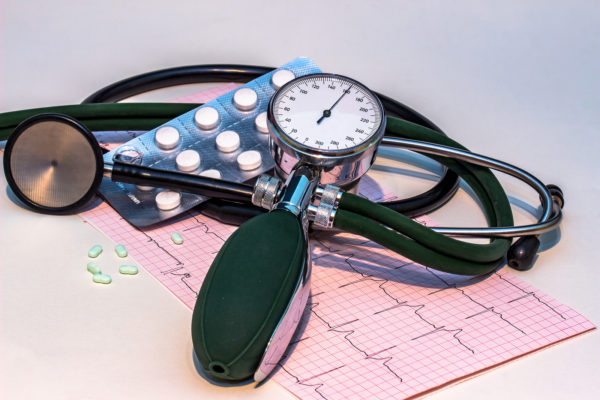How to Prevent Heart Disease: What Everyone Needs to Know
Written by tyemedical on Mar 6th 2020
Did you know that in onedayyour heart beats about 100,000 times and pumps 2,000 gallons of blood through your body? It’s a sobering thought when we consider how little most of us think about this fist-sized organ that supports our entire existence. According to a 2019 report by the American Heart Association, nearly half of Americans have some form of heart disease.
In honor of American Heart Month, the Tye Medical team has compiled some important information about how to prevent heart disease and maintain an overall healthy heart.
For those of you who think your health is too far gone, think again! Research shows it’s never too late to start caring for your heart. Some simple steps could add years to your life.
 What Is Heart Disease Anyway?
What Is Heart Disease Anyway?
We’ve all heard of it, and we know it’s bad, but if want to learn how to prevent heart disease, then it’s important to nail down exactly what this condition means for our bodies. Also known as cardiovascular disease, it refers to several different conditions specific to the heart such as:
- Coronary artery disease (hardening of arteries around the heart)
- Heart attack (myocardial infarction, when blood flow is interrupted resulting in damage to part of the heart muscle)
- Heart failure (congestive heart failure, when the heart fails to circulate blood effectively)
- Arrhythmias (problems with heart rhythm)
- Congenital heart defects (present from birth)
Not every type of heart disease is preventable, but for most of us, maintaining a healthy heart means practicing healthy habits that defend against the Big Three: coronary artery disease, heart attack, and heart failure. Understanding how to prevent heart disease means recognizing the underlying conditions that promote it. You can identify the warning signs and reverse course before ever being diagnosed with one or more of the Big Three.
Common Conditions Leading to Heart Disease
Here’s the problem: most of us expect to be diagnosed with high blood pressure or high cholesterol at some point in our lives. Our doctors prescribe medication, and we take our cholesterol and blood pressure pills just like most Americans age 50 and older. No big deal, right?
Well, if you want to prevent heart disease, then these conditions are a very big deal, because they’re its predecessors.
High Cholesterol
Cholesterol is a fatty substance that’s necessary to your body’s proper function. It’s used to make certain hormones, produce vitamin D, and build healthy cells. Your body makes some on its own and gets the rest from food. The problem usually arises when you’re getting too much cholesterol through food, resulting in a high blood cholesterol level.
When this happens, the excessive oily goo in your blood begins sticking to the walls of your arteries. Eventually, a thick, fatty buildup forms inside the arteries, much like how your household plumbing clogs up over the years. As time passes, the cholesterol hardens, forming a plaque that damages the arteries, making them stiff and narrow. When this happens in vessels throughout your body, it is called atherosclerosis (hardening of the arteries). When it happens in the arteries around your heart, it’s called coronary artery disease.
Either condition causes restricted blood flow through the arteries, which has some serious consequences, like chronic high blood pressure, heart attack, and heart failure. In fact, according to the CDC, in 2017, coronary artery disease caused the death of over 350,000 people in the U.S. alone.
High Blood Pressure
High cholesterol frequently leads to high blood pressure due to the smaller openings in your vessels. Your blood must squeeze through the narrowed openings, meaning your heart has to pump harder to maintain proper circulation. When your blood pushes against the walls of your blood vessels with increased force, consistently, then you’re considered to have high blood pressure.
Imagine your heart straining to squeeze blood through your narrowed vessels, forcefully pushing the hard plaque against the blood vessel walls, consequently damaging your arteries. This overworks your heart and puts you at higher risk for aneurysms. It’s not a pleasant thought.
As your heart is forced to work extra hard for years or decades, your risk of heart attack and heart failure significantly increase.
Even without high cholesterol, you may still be at risk. For those who have high blood pressure for some other reason (often from very high levels of sustained stress), the condition still damages artery walls and overworks the heart. The result is the same – increased risk of heart attack, heart failure, and aneurysm.
How to Prevent Heart Disease with 3 Lifestyle Changes
Are you wondering if there’s some new way to prevent heart disease? Are you thinking the latest research has probably uncovered some amazing new prevention strategy? We wondered about that too, but the truth is, there’s nothing new. Heart disease is very easy to prevent – for most people at least.
Aside from not smoking and minimizing your alcohol intake, here are some other important ways to guard your heart.
 1. Stick to a plant-based diet
1. Stick to a plant-based diet
Load up on fruits and veggies! Not only does a diet consisting of few animal products help protect you against cancer, it also boosts cardiovascular health. Research shows a strong link between heart health and diet, and some doctors, like Caldwell Esselstyn Jr., M.D., a retired Cleveland Clinic surgeon, call heart disease a “food-borne illness”.
Chez Monique – Healthy Food Hand Made
When asked how to prevent heart disease, many doctors will recommend the Mediterranean diet. It’s largely plant-based but isn’t strictly vegan, making it easier for most Americans to stick to. The diet is rich in unprocessed (or minimally processed) plant products like fresh produce, beans, whole grains (brown rice, quinoa, barley, etc.). However, it also allows for limited animal products, mostly fish and poultry, and moderate amounts of dairy. Mediterranean diet cookbooks are widely available, and you can usually find free recipes online.
How does it lower your risk for heart disease?
First, a plant-based diet lowers LDL (bad) cholesterol by reducing your dietary cholesterol intake – the cholesterol you get from food. Simply put, you’re just consuming less cholesterol. Second, it increases the intake of foods rich in fiber, vitamins, minerals, and other nutrients that lower LDL cholesterol and blood pressure. Not only will you be keeping your levels from rising, you’ll actually be actively lowering them. Lastly, a plant-based diet also reduces your risk of diabetes by helping you maintain a healthy weight.
 2. Find Ways to Exercise More
2. Find Ways to Exercise More
Moderate-intensity workouts performed for at least 30 minutes, 5 days a week, strengthen your heart, which means it doesn’t have to work so hard to pump blood through your body. Additionally, it helps to lower LDL (bad) cholesterol, raise HDL (good) cholesterol, and lower blood pressure.
Researchers now believe that adequate exercise stimulates enzymes that help move LDL from the blood (and blood-vessel walls) to the liver where it’s converted to bile or is processed as waste. In other words, it helps your body get rid of excess blood cholesterol before it makes itself at home in your arteries. Additionally, exercise seems to alter the protein particles that carry cholesterol through your bloodstream, making it more difficult for them to adhere to the walls of blood vessels.
So, what kind of “moderate” exercise do you need to prevent heart disease?
Power walking, running, swimming, or cycling are some accessible options. If it’s difficult to talk during your workout, then you’re on the right track. Remember to work up to this slowly. Gradually increase intensity and be sure to check with your doctor before starting a new exercise program, especially if you have diagnosed health conditions or suspect a problem.
All walking and activity that increases your heart rate is helpful. So, don’t be discouraged if you’re not “power” walking yet. Just get moving. Find little ways to add some activity to your day and build healthy habits. It gets easier and easier and pretty soon, you won’t even notice the tiny bit of extra time it requires.
3. Get Your Rest
Yes, you’ve heard this before, but did you know that inadequate sleep increases your risk of heart disease? Lack of sleep increases stress levels, inflammation, high blood pressure, and weight gain. All these factors have a huge impact on your heart health.
The American Academy of Sleep Medicine recommends at least 7 hours of sleep each night for overall health, including cardiovascular health. When you don’t get enough rest, you’re overworking your entire body. Sleep is necessary for healing and rejuvenation for all bodily systems.
If you wake up in the morning and feel unrested and fatigued, talk to your doctor about undergoing a sleep study. Untreated sleep apnea wreaks havoc on heart health and greatly increases your risk of various forms of heart disease. Sometimes, it’s much more than just loud snoring.
 Have Questions About Our Products?
Have Questions About Our Products?
We understand that managing your health can seem overwhelming at times. How can you be expected to prevent cancer and protect against heart disease while also struggling with a challenging condition like incontinence?
Well this is where our expertise lies! If you want more information about our incontinence products and solutions, then please check out our thorough and informative Frequently Asked Questions page. If you have a specific question that’s not answered there, then you can just speak to our friendly customer service!
Come see for yourself why our premium products are considered to be the best quality on the market!

